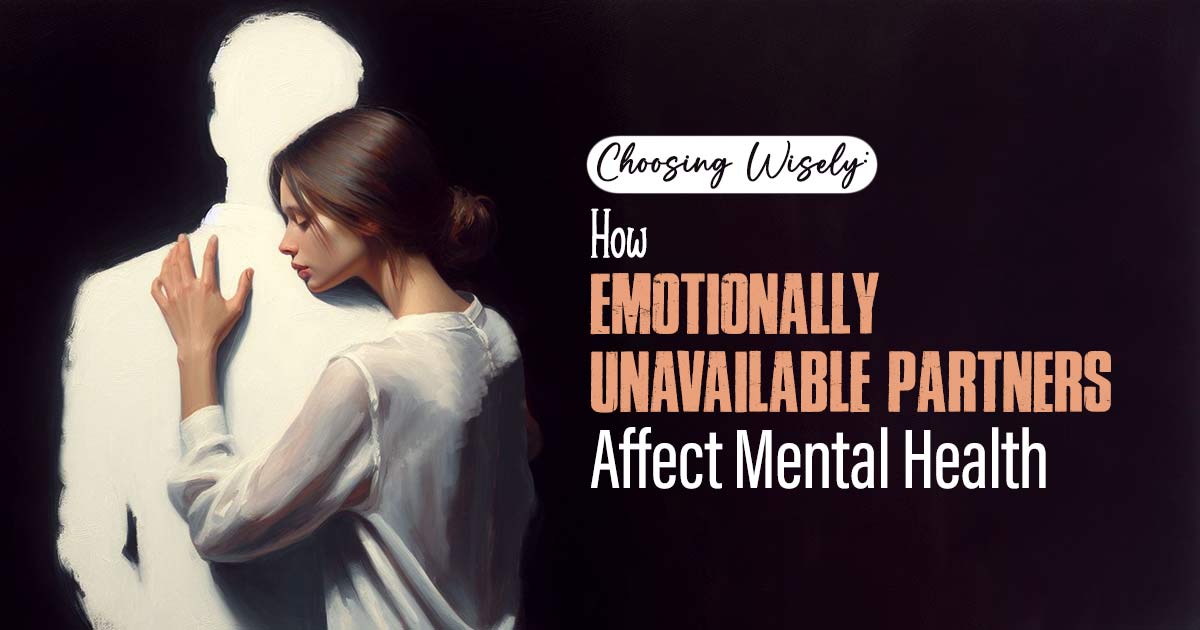In the intricate dance of relationships, emotional intimacy plays a pivotal role in fostering a deep connection and overall well-being. However, when confronted with an emotionally unavailable partner, the toll on mental health can be substantial.
1. The Struggle For Emotional Connection
At the core of any healthy relationship lies the ability to establish and nurture an emotional connection. Choosing emotionally unavailable partners, however, presents a significant obstacle to this fundamental aspect. The struggle to forge a deep bond can lead to feelings of loneliness and isolation, contributing to the erosion of mental well-being. Without the anchor of emotional connection, individuals may find themselves grappling with a sense of emptiness and unfulfillment.
2. Communication Challenges
Effective communication is the bedrock of any successful relationship. In the context of emotional unavailability, communication becomes a battleground of unspoken emotions and unaddressed needs.
Conversations about feelings become elusive, and attempts at expressing vulnerability may be met with disinterest or a palpable lack of engagement. This breakdown in communication not only hinders the resolution of conflicts but also fosters an environment where emotional needs are left unmet, taking a toll on mental health over time.
3. Impact On Self-Esteem
The emotional unavailability of a partner has a profound impact on an individual’s self-esteem. Constantly seeking emotional validation and support that goes unreciprocated can lead to feelings of inadequacy and self-doubt.
Individuals may begin to question their own worth within the relationship, wondering if their inability to connect emotionally is a reflection of personal shortcomings. This erosion of self-esteem can have far-reaching consequences, influencing not only the dynamics of the relationship but also the individual’s overall mental health.
4. The Loneliness Paradox
While being in a relationship typically implies companionship, emotionally unavailable partners can paradoxically foster a profound sense of loneliness. The lack of emotional intimacy, despite physical proximity, can leave individuals feeling isolated and disconnected.
Loneliness, a known contributor to mental health issues such as depression and anxiety, becomes a persistent companion in relationships marked by emotional unavailability. The irony lies in the emotional distance within the relationship, turning it into a source of emotional distress rather than solace.
5. Frustration And Confusion
Navigating a relationship with emotionally unavailable partners often entails grappling with frustration and confusion. The frustration stems from the one-sided effort to establish emotional closeness, with the other partner seemingly indifferent or unresponsive.
Mixed signals and conflicting messages only compound the confusion, leaving individuals uncertain about the state of the relationship and their partner’s true emotional availability. This ongoing emotional turbulence becomes a breeding ground for stress and anxiety, further impacting mental health.
6. Internalization Of Emotional Struggle
In the face of choosing emotionally unavailable partners, individuals may internalize the emotional struggle, attributing the distance and lack of connection to personal inadequacies. The inability to evoke a more emotionally engaged response may lead to self-blame, intensifying feelings of guilt or unworthiness.
This internalization process can be insidious, seeping into various aspects of an individual’s life and contributing to a negative self-perception that can be challenging to overcome without intervention.
7. Difficulty In Resolving Issues
Relationships are bound to face challenges, and their resolution often hinges on open communication and emotional understanding. However, emotional unavailability poses a significant hurdle to effectively addressing conflicts. Partners who avoid emotional discussions may sidestep the root causes of issues, leaving problems unresolved and simmering beneath the surface. The cumulative effect is an environment of chronic tension and unmet emotional needs, amplifying the strain on mental health.
8. Longing For Change and Unmet Desires
Living with emotionally unavailable partners can engender a persistent longing for positive change. The desire for a deeper emotional connection and increased engagement becomes a driving force, but when unmet, it transforms into a source of ongoing dissatisfaction.
This unfulfilled longing contributes to a sense of stagnation within the relationship, fostering a yearning for emotional fulfillment that remains elusive. The gap between desires and reality becomes a breeding ground for discontent, impacting mental health through sustained emotional discontent.
9. Emotional Exhaustion And Well-being
Attempting to connect with emotionally unavailable partners can be emotionally exhausting. The constant effort to breach the emotional distance, coupled with the disappointment of unmet needs, takes a toll on overall well-being. Emotional exhaustion, characterized by feelings of fatigue, burnout, and a diminished capacity to cope, becomes a common experience.
This state of perpetual emotional drain can contribute to heightened stress levels, exacerbating mental health challenges and potentially leading to more severe conditions if left unaddressed.The impact of choosing emotionally unavailable partners on mental health is a multifaceted and complex phenomenon. From the erosion of emotional connection to the internalization of emotional struggles, the toll is palpable.
Recognizing the signs and understanding the dynamics at play is crucial for individuals navigating such relationships. Seeking support, whether through communication, therapy, or self-care, becomes essential in mitigating the detrimental effects and fostering a path towards emotional healing and overall well-being. It is only through acknowledging and addressing these challenges that individuals can hope to cultivate healthier, more fulfilling relationships that nurture both emotional and mental health.



